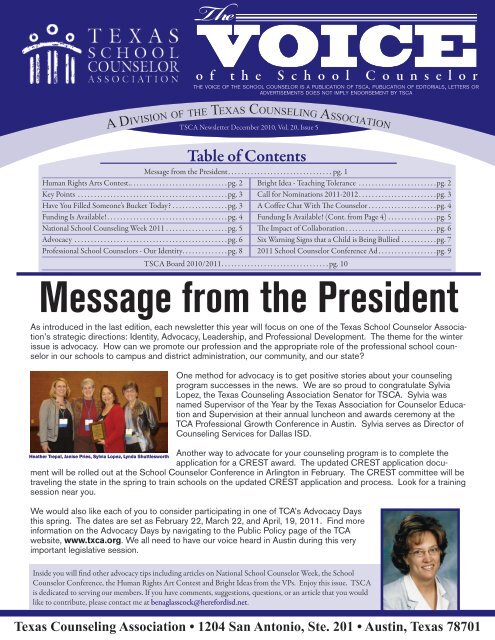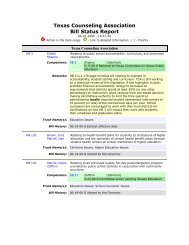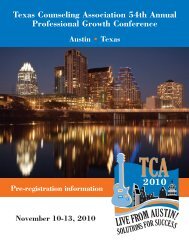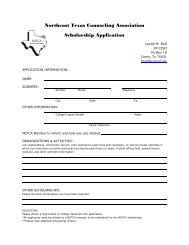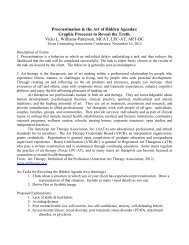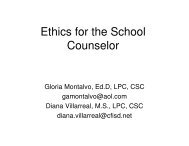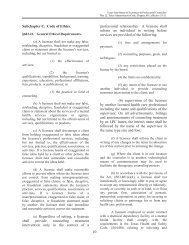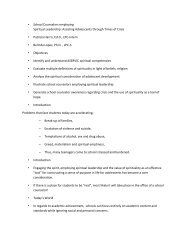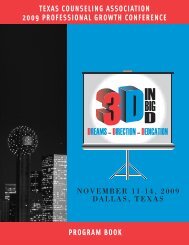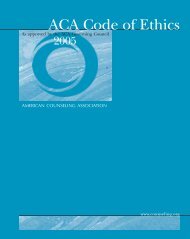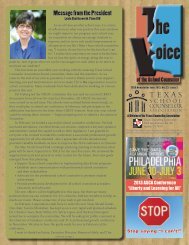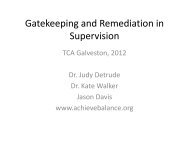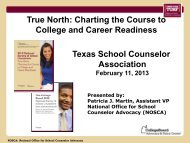Voice of the School Counselor - Texas Counseling Association
Voice of the School Counselor - Texas Counseling Association
Voice of the School Counselor - Texas Counseling Association
Create successful ePaper yourself
Turn your PDF publications into a flip-book with our unique Google optimized e-Paper software.
The<br />
o f t h e S c h o o l C o u n s e l o r<br />
<strong>the</strong> voice <strong>of</strong> <strong>the</strong> school counselor is a publication <strong>of</strong> tsca. publication <strong>of</strong> editorials, letters or<br />
advertisements does not imply endorsement by tsca<br />
A Division <strong>of</strong> <strong>the</strong> <strong>Texas</strong> <strong>Counseling</strong> <strong>Association</strong><br />
TSCA Newsletter December 2010, Vol. 20, Issue 5<br />
Table <strong>of</strong> Contents<br />
Message from <strong>the</strong> President . . . . . . . . . . . . . . . . . . . . . . . . . . . . . . . . pg. 1<br />
Human Rights Arts Contest. . . . . . . . . . . . . . . . . . . . . . . . . . . . . . . pg. 2 Bright Idea - Teaching Tolerance . . . . . . . . . . . . . . . . . . . . . . . .pg. 2<br />
Key Points . . . . . . . . . . . . . . . . . . . . . . . . . . . . . . . . . . . . . . . . . . . . . . pg. 3 Call for Nominations 2011-2012 . . . . . . . . . . . . . . . . . . . . . . . .pg. 3<br />
Have You Filled Someone’s Bucket Today? . . . . . . . . . . . . . . . . . pg. 3 A C<strong>of</strong>fee Chat With The <strong>Counselor</strong> . . . . . . . . . . . . . . . . . . . . .pg. 4<br />
Funding Is Available! . . . . . . . . . . . . . . . . . . . . . . . . . . . . . . . . . . . . . pg. 4 Fundung Is Available! (Cont. from Page 4) . . . . . . . . . . . . . . .pg. 5<br />
National <strong>School</strong> <strong>Counseling</strong> Week 2011 . . . . . . . . . . . . . . . . . . . pg. 5 The Impact <strong>of</strong> Collaboration . . . . . . . . . . . . . . . . . . . . . . . . . . . .pg. 6<br />
Advocacy . . . . . . . . . . . . . . . . . . . . . . . . . . . . . . . . . . . . . . . . . . . . . . . pg. 6 .Six Warning Signs that a Child is Being Bullied . . . . . . . . . . .pg. 7<br />
Pr<strong>of</strong>essional <strong>School</strong> <strong>Counselor</strong>s - Our Identity . . . . . . . . . . . . . . pg. 8 2011 <strong>School</strong> <strong>Counselor</strong> Conference Ad . . . . . . . . . . . . . . . . . .pg. 9<br />
TSCA Board 2010/2011 . . . . . . . . . . . . . . . . . . . . . . . . . . . . . . . . . pg. 10<br />
Message from <strong>the</strong> President<br />
As introduced in <strong>the</strong> last edition, each newsletter this year will focus on one <strong>of</strong> <strong>the</strong> <strong>Texas</strong> <strong>School</strong> <strong>Counselor</strong> <strong>Association</strong>’s<br />
strategic directions: Identity, Advocacy, Leadership, and Pr<strong>of</strong>essional Development. The <strong>the</strong>me for <strong>the</strong> winter<br />
issue is advocacy. How can we promote our pr<strong>of</strong>ession and <strong>the</strong> appropriate role <strong>of</strong> <strong>the</strong> pr<strong>of</strong>essional school counselor<br />
in our schools to campus and district administration, our community, and our state?<br />
One method for advocacy is to get positive stories about your counseling<br />
program successes in <strong>the</strong> news. We are so proud to congratulate Sylvia<br />
Lopez, <strong>the</strong> <strong>Texas</strong> <strong>Counseling</strong> <strong>Association</strong> Senator for TSCA. Sylvia was<br />
named Supervisor <strong>of</strong> <strong>the</strong> Year by <strong>the</strong> <strong>Texas</strong> <strong>Association</strong> for <strong>Counselor</strong> Education<br />
and Supervision at <strong>the</strong>ir annual luncheon and awards ceremony at <strong>the</strong><br />
TCA Pr<strong>of</strong>essional Growth Conference in Austin. Sylvia serves as Director <strong>of</strong><br />
<strong>Counseling</strong> Services for Dallas ISD.<br />
Hea<strong>the</strong>r Trepal, Janise Pries, Sylvia Lopez, Lynda Shuttlesworth<br />
Ano<strong>the</strong>r way to advocate for your counseling program is to complete <strong>the</strong><br />
application for a CREST award. The updated CREST application document<br />
will be rolled out at <strong>the</strong> <strong>School</strong> <strong>Counselor</strong> Conference in Arlington in February. The CREST committee will be<br />
traveling <strong>the</strong> state in <strong>the</strong> spring to train schools on <strong>the</strong> updated CREST application and process. Look for a training<br />
session near you.<br />
We would also like each <strong>of</strong> you to consider participating in one <strong>of</strong> TCA’s Advocacy Days<br />
this spring. The dates are set as February 22, March 22, and April, 19, 2011. Find more<br />
information on <strong>the</strong> Advocacy Days by navigating to <strong>the</strong> Public Policy page <strong>of</strong> <strong>the</strong> TCA<br />
website, www.txca.org. We all need to have our voice heard in Austin during this very<br />
important legislative session.<br />
Inside you will find o<strong>the</strong>r advocacy tips including articles on National <strong>School</strong> <strong>Counselor</strong> Week, <strong>the</strong> <strong>School</strong><br />
<strong>Counselor</strong> Conference, <strong>the</strong> Human Rights Art Contest and Bright Ideas from <strong>the</strong> VPs. Enjoy this issue. TSCA<br />
is dedicated to serving our members. If you have comments, suggestions, questions, or an article that you would<br />
like to contribute, please contact me at benaglasscock@herefordisd.net.<br />
<strong>Texas</strong> <strong>Counseling</strong> <strong>Association</strong> • 1204 San Antonio, Ste. 201 • Austin, <strong>Texas</strong> 78701
HUMAN RIGHTS ART CONTEST<br />
by Laura Bannerman, Human Rights Chair<br />
Whe<strong>the</strong>r we would like to admit it or not, <strong>the</strong>re are injustices that happen all over <strong>the</strong> world and even in our neighborhoods. It seems daily<br />
that we hear in <strong>the</strong> news about victims <strong>of</strong> abuse, human trafficking, racism, people fleeing <strong>the</strong>ir country because <strong>of</strong> persecution, etc. These<br />
injustices are heart breaking.<br />
One <strong>of</strong> <strong>the</strong> bright spots that sometimes <strong>the</strong> media fails to recognize is that <strong>the</strong>re are numerous people and organizations making a difference<br />
in <strong>the</strong> area <strong>of</strong> advocating for human rights <strong>of</strong> people who may not o<strong>the</strong>rwise have a voice. As school counselors, we advocate for our<br />
families and students who may be facing some <strong>of</strong> <strong>the</strong>se injustices or who have in <strong>the</strong> past. We also promote human rights through our developmental<br />
guidance program. TSCA’s Human Rights Art Contest gives students <strong>the</strong> opportunity to put into action what <strong>the</strong>y have learned and<br />
express <strong>the</strong>ir passion for justice for all people.<br />
This art contest is a way to encourage students to highlight people and organizations that make a difference in <strong>the</strong> lives <strong>of</strong> people who are<br />
victims <strong>of</strong> injustices. This year <strong>the</strong> <strong>the</strong>me is “Make a Difference---Show You Care.” All participants will receive a certificate <strong>of</strong> participation and<br />
we will have first and second prizes awarded at each level-elementary, junior high/middle school, and high school. First prize winners receive<br />
a $500 savings bond and second prize winners receive a $250 savings bond. The deadline for <strong>the</strong> art contest is March 1, 2011. Visit <strong>the</strong><br />
TSCA website for <strong>the</strong> art contest entry form at http://www.txca.org/tca/TSCA_Home.asp?SnID=198251945 under resources.<br />
Ways to promote TSCA’s Human Rights Art Contest:<br />
• Include <strong>the</strong> entry form in <strong>the</strong> school newsletter and/or website.<br />
- Begin promoting <strong>the</strong> contest in Jan. or Feb. to give students adequate time to prepare <strong>the</strong>ir entries.<br />
- Remind students <strong>of</strong> <strong>the</strong> contest through <strong>the</strong> school announcements or e-blasts.<br />
- For high school, counselors may want to include this contest as a scholarship opportunity in a senior newsletter.<br />
• During National <strong>School</strong> <strong>Counselor</strong>’s Week (Feb. 7th-11th) host a school art contest using <strong>the</strong> same <strong>the</strong>me and art contest entry form as<br />
TSCA. Post <strong>the</strong> participants’ work outside your <strong>of</strong>fice or in <strong>the</strong> library. Then by March 1st turn in <strong>the</strong> entries for <strong>the</strong> contest.<br />
- Then when <strong>the</strong> participation certificates arrive have a reception for participants and <strong>the</strong>ir families.<br />
• Conduct Guidance Lessons on “Making a Difference-Show you Care”<br />
- Have students begin on <strong>the</strong>ir entry at <strong>the</strong> end <strong>of</strong> <strong>the</strong> lesson or hand out entry forms to students who may be interested in entering.<br />
- Visit <strong>the</strong> TSCA website under Bright Ideas for sample guidance lessons that you may use.<br />
- If you have a lesson to share, send it to llbannerman@gmail.com to be shared.<br />
• Involve your Art Teacher-Inform your art teacher <strong>of</strong> <strong>the</strong> contest.<br />
- Your art teacher may be able to integrate <strong>the</strong> art contest into his/her curriculum.<br />
- Your art teacher may also want to provide students opportunities to work on <strong>the</strong>ir entries after school or during a<br />
special time during <strong>the</strong> day.<br />
• Involve your History/Social Studies teachers in promoting <strong>the</strong> art contest.<br />
• Inform clubs or organizations in your school or community<br />
- Ex. PALS, Best Buddies, Boy Scouts, Girl Scouts, etc.,<br />
• Organize a club after school one day a week for a month-Care Club/Human Rights Club<br />
- Help students brainstorm ideas<br />
- Provide materials for <strong>the</strong> art contest<br />
Please contact Laura Bannerman at llbannerman@gmail.com if you have any questions about <strong>the</strong> Human Rights contest or<br />
how to promote it.<br />
Bright Idea<br />
Genevieve Bennetts, MS Vice President<br />
Teaching Tolerance was created in 1991 as a project <strong>of</strong> <strong>the</strong> Sou<strong>the</strong>rn Poverty Law Center and according to<br />
<strong>the</strong>ir website is “dedicated to reducing prejudice, improving intergroup relations and supporting equitable<br />
school experiences for our nation’s children.” They <strong>of</strong>fer a free magazine which is distributed in <strong>the</strong> United<br />
States and abroad to over 400,000 educators as well as an email newsletter containing links to <strong>the</strong> magazine<br />
articles online. They also have free curriculum kits available for order that address <strong>the</strong> issue <strong>of</strong> tolerance<br />
throughout history and in our current society. Their teaching materials have won two Oscars, an Emmy and<br />
more than 20 honors from <strong>the</strong> <strong>Association</strong> <strong>of</strong> Educational Publishers.<br />
For more information please visit: http://www.tolerance.org/<br />
KEY POINTS TO KEEP IN<br />
MIND AS YOU ADVOCATE<br />
FOR COUNSELING!<br />
By Linda Hughes, Advocacy Chair<br />
It is that time again! The 82nd Legislature will be meeting this spring and <strong>the</strong>re are a few <strong>School</strong> <strong>Counselor</strong> issues on <strong>the</strong><br />
Public Policy Agenda.<br />
Save <strong>the</strong> date for Advocacy Days:<br />
February 22, 2011 • March 22, 201 • April 19, 2011<br />
Each Advocacy Day will begin with breakfast in <strong>the</strong> Capitol Cafeteria located on <strong>the</strong> first floor <strong>of</strong> <strong>the</strong> Capitol extension, followed by an orientation.<br />
The orientation will include an Advocacy Day Packet that includes resource materials to share with your elected <strong>of</strong>ficials as well as<br />
updates on bills, committee meetings and o<strong>the</strong>r events that will be considered by <strong>the</strong> Legislature on that particular Advocacy Day.<br />
An <strong>of</strong>fice visit is one <strong>of</strong> <strong>the</strong> most effective ways to communicate your interest in an issue or bill and to build a relationship with your elected<br />
<strong>of</strong>ficial. We encourage you to call to schedule an appointment with your Representative or Senator or <strong>the</strong>ir staff while you are in Austin. If you<br />
are unable to confirm an appointment with your elected <strong>of</strong>ficial, ask to meet with <strong>the</strong> staff person who handles mental health or education issues,<br />
depending on your area <strong>of</strong> interest. Meeting with staff can be as, if not more, effective than meeting with your Legislator.<br />
<strong>Texas</strong> <strong>School</strong> <strong>Counselor</strong> <strong>Association</strong> will provide a packet <strong>of</strong> information and power points for your chapter to use prior to attending Advocacy<br />
Days. We will post <strong>the</strong> materials on our website as soon as we finalize <strong>the</strong> materials. These materials may be used to promote advocacy<br />
within your organization and colleagues.<br />
Here is a brief outline <strong>of</strong> what to do when you visit <strong>the</strong> Capitol:<br />
• Introduce yourself and tell where you live<br />
• State <strong>the</strong> purpose <strong>of</strong> <strong>the</strong> visit<br />
• Tell your story<br />
• Ask to meet <strong>the</strong> staff person<br />
• Thank <strong>the</strong>m for <strong>the</strong>ir time<br />
As Pr<strong>of</strong>essional <strong>School</strong> <strong>Counselor</strong>s, we are <strong>the</strong> VOICE to support and advocate for our pr<strong>of</strong>ession. If not you, <strong>the</strong>n who else will do it?<br />
CALL FOR NOMINATIONS 2011-2012<br />
WATCH FOR THE TCA NOMINATION ANNOUNCEMENT<br />
THE NOMINATION PROCESS WILL BEGIN JANUARY 7, 2011<br />
ENDING AT MIDNIGHT FEB 1, 2011<br />
TSCA PRESIDENT-ELECT<br />
The President-Elect is a three-year commitment to serve as President-Elect, President, <strong>the</strong>n as Past-President. The year as President-Elect<br />
is for learning <strong>the</strong> processes and procedures <strong>of</strong> TSCA as well as for beginning preparation for <strong>the</strong> year as President.<br />
HIGH SCHOOL VICE-PRESIDENT • COLLEGE EDUCATOR VICE-PRESIDENT • COUNSELOR SUPERVISORY VICE-PRESIDENT<br />
The candidates for <strong>the</strong>se positions must be currently employed in <strong>the</strong> area that <strong>the</strong>y are elected to represent (i.e. be a High <strong>School</strong> <strong>Counselor</strong>,<br />
<strong>Counselor</strong> Educator, or <strong>Counseling</strong> Director or Coordinator <strong>of</strong> a district program). If elected <strong>the</strong>y serve to represent <strong>the</strong> pr<strong>of</strong>essional school<br />
counselors <strong>of</strong> <strong>the</strong>ir respective areas and serve as a resource for state concerns. Each position is a two-year commitment.<br />
TSCA SENATOR<br />
The Senator works closely with <strong>the</strong> TSCA Director to promote <strong>the</strong> needs and concerns <strong>of</strong> TSCA to TCA. This position is a three-year<br />
commitment.<br />
Michelle Shoulders Elementary VP<br />
<strong>Counselor</strong>s are always thinking <strong>of</strong> ways to get students to focus on being kind to each o<strong>the</strong>r. One<br />
idea is to read “Have you Filled a Bucket Today?” by Carol McCloud. You can read it during guidance<br />
lessons or have teachers read <strong>the</strong> book to each <strong>of</strong> <strong>the</strong>ir classes. The book discusses how each person<br />
carries an invisible bucket that needs to be filled. The way to fill <strong>the</strong>se buckets is to smile, be polite, be<br />
helpful and kind, etc. Provide each classroom a bucket or have teachers provide a bucket for <strong>the</strong>ir own<br />
rooms. Let students know to be on <strong>the</strong> lookout for kind behaviors that fill buckets. When <strong>the</strong>y see one,<br />
<strong>the</strong>y can write it on a slip <strong>of</strong> paper and place it in <strong>the</strong> bucket. At <strong>the</strong> end <strong>of</strong> each week, a student or <strong>the</strong><br />
teacher can read <strong>the</strong> slips to <strong>the</strong> class. The class can work each week to fill <strong>the</strong>ir class bucket.<br />
2 3
A COFFEE CHAT WITH THE COUNSELOR<br />
by Dr. Leon Kilpatrick, <strong>Counselor</strong> Educator, Vice President, <strong>Counselor</strong> Supervisor, Dallas ISD<br />
With all that is being put on our work plate as counselors, it is difficult to keep up with <strong>the</strong> key<br />
foundation in what we do as counselors which is building relationships with our stakeholders.<br />
With a fast track schedule almost on a daily basis, sometimes just being able to return a phone call<br />
within 24 hours can be a major effort. This is especially true with parents who are also on <strong>the</strong> go but<br />
expect an immediate return phone call from you about <strong>the</strong>ir child/children. One practice to help establish<br />
and maintain a relationship with parents is to have a set time and campus location to simply meet with<br />
parents over c<strong>of</strong>fee (or tea). This informal meeting, c<strong>of</strong>fee chat, would be a time to dialogue with parents about counseling<br />
concerns with <strong>the</strong>ir child/children. No agenda or appointment is needed. Your c<strong>of</strong>fee chat with <strong>the</strong> parent could be<br />
held before or after school depending on your unique campus needs and resources. The c<strong>of</strong>fee chat could be as short<br />
as 15 minutes one or two days a week. This might be particularly useful for parents <strong>of</strong> upper classmen who may also be<br />
very busy and not have <strong>the</strong> time to meet for a parent conference but still have a need to have an answer to an important,<br />
yet quick question. One suggestion to help establish <strong>the</strong> best time to have your c<strong>of</strong>fee chat is to include <strong>the</strong> question on<br />
your <strong>Counseling</strong> Needs Assessment Survey or take a poll at parent meetings such as <strong>the</strong> PTA. The bottom line is to<br />
establish a forum in which you can build new relationships and maintain old relationships with parents while chatting over<br />
a cup <strong>of</strong> c<strong>of</strong>fee. Providing such a forum on a consistent basis can help reduce phone calls from parents or <strong>the</strong> need to<br />
return calls during <strong>the</strong> work day. Also, it gives you <strong>the</strong> opportunity to communicate in person with a key stakeholder who<br />
has a vested interest in <strong>the</strong> academic success <strong>of</strong> your student, <strong>the</strong> parent.<br />
Funding is available! ‘Get Connected’ to <strong>the</strong><br />
<strong>Texas</strong> Virtual <strong>School</strong> Network (TxVSN)!<br />
By Laura I. Hodges, MA, LPC-S, NCC, ACS<br />
In Senate Bill 1788, <strong>the</strong> 80th <strong>Texas</strong> Legislature established a state virtual school network to provide online courses for<br />
<strong>Texas</strong> students. The <strong>Texas</strong> Virtual <strong>School</strong> Network (TxVSN) began serving students in January 2009 with a fee-based catalog <strong>of</strong><br />
foundation courses.<br />
State virtual school allotment funds<br />
The 81st <strong>Texas</strong> Legislature created a ‘state virtual school allotment’ in House Bill 3646. This funding can be used to<br />
pay for online courses taken through TxVSN that students have successfully completed. In order to be eligible for access to<br />
state virtual school allotment funds, <strong>the</strong> online course must:<br />
• satisfy a curriculum requirement for <strong>the</strong> student’s graduation<br />
• be provided through <strong>the</strong> TxVSN, and<br />
• be part <strong>of</strong> <strong>the</strong> student’s normal course load. Additional funding for courses taken outside<br />
<strong>the</strong> normal course load is also available.<br />
A student has successfully completed a course when <strong>the</strong>y have achieved a final grade <strong>of</strong> 70 or better, and have completed<br />
all required course activities and assessments. When <strong>the</strong>se requirements have been met, <strong>the</strong>n <strong>the</strong> course provider (<strong>the</strong> entity<br />
teaching <strong>the</strong> online course) will receive $400 in allotment funds, and <strong>the</strong> receiving district or open enrollment charter school<br />
where <strong>the</strong> student is enrolled will receive $80. The <strong>Texas</strong> Education Agency (TEA) Finance division will electronically deposit<br />
allotment funds for successfully completed courses into a district’s account in a timely manner.<br />
Increased academic opportunities<br />
There are a variety <strong>of</strong> online courses available to students through TxVSN. Foundation and elective courses, Advanced<br />
Placement® and dual credit courses are all available in <strong>the</strong> TxVSN course catalog. These courses are provided by public<br />
school districts, open enrollment charter schools, educational service centers, or colleges and universities. Each course has<br />
undergone a rigorous course review to ensure that each course is 100% TEKS-aligned and also aligned with <strong>the</strong> International<br />
<strong>Association</strong> for K-12 Online Learning’s National Standards <strong>of</strong> Quality for Online Courses. High school courses are led by a<br />
<strong>Texas</strong> certified instructor in <strong>the</strong> subject area taught who has completed TxVSN-approved pr<strong>of</strong>essional development in online<br />
instruction.<br />
(Cont. from Page 4)<br />
District and Open<br />
Enrollment Charter<br />
Participation<br />
4 5<br />
29<br />
193<br />
335<br />
420<br />
District participation<br />
As depicted in <strong>the</strong> chart, district participation in <strong>the</strong> TxVSN continues to<br />
grow. The opportunity to take a TxVSN online course has provided academic<br />
opportunities for students not previously available to some districts and open<br />
enrollment charter schools, as well as allowing for flexibility in scheduling due to<br />
master schedule constraints.<br />
Is online learning <strong>the</strong> best option for a student?<br />
It is important to find out if students have <strong>the</strong> knowledge, attributes, and<br />
Spring 2009<br />
Spring 2010<br />
Summer 2010<br />
skills necessary to be successful in an online course. TxVSN provides SmarterMeasure<br />
at no cost to each district completing <strong>the</strong> TxVSN district registra-<br />
Fall 2010<br />
September 30, 2010<br />
tion process. SmarterMeasure is a web-based pre-assessment that can assist<br />
districts in seeing what types <strong>of</strong> support a student may need in order to be successful in a course. Additionally, this pre-assessment<br />
can also help students see what <strong>the</strong>y need to do to support <strong>the</strong>ir own success in online learning. Self motivation, time<br />
management skills, persistence, and on screen reading rate and recall are just a few <strong>of</strong> <strong>the</strong> areas included on a summary report<br />
that is provided upon student completion <strong>of</strong> <strong>the</strong> pre-assessment. Carefully matching student skills to <strong>the</strong> online learning environment<br />
helps ensure an appropriate academic setting for <strong>the</strong> student.<br />
How does a district ‘get connected’ to TxVSN?<br />
All districts and open enrollment charter schools are invited to visit <strong>the</strong> TxVSN website at www.txvsn.org . Regularly<br />
scheduled informational and training webinars are available, as well as TETN sessions which may be accessed through regional<br />
education service centers. Additionally, <strong>the</strong> TxVSN Help Desk may be contacted at 1-866-938-9876 or emailed at txvsncentral@txvsn.org.<br />
National <strong>School</strong><br />
<strong>Counseling</strong> Week 2011<br />
by Michael Kaprelian, President-Elect<br />
National <strong>School</strong> <strong>Counseling</strong> Week 2011 will be celebrated <strong>the</strong> week <strong>of</strong> February<br />
7 through 11, 2011. This event is a week-long celebration to focus public attention on<br />
<strong>the</strong> unique contribution <strong>of</strong> pr<strong>of</strong>essional school counselors and our role in promoting<br />
academic success, career development, as well as <strong>the</strong> social and emotional development <strong>of</strong><br />
<strong>the</strong> students we serve. Sponsored by <strong>the</strong> American <strong>School</strong> <strong>Counselor</strong> <strong>Association</strong> (ASCA), National<br />
<strong>School</strong> <strong>Counseling</strong> Week provides an effective means <strong>of</strong> educating stakeholders about <strong>the</strong> vital work <strong>of</strong> <strong>the</strong><br />
school counselor.<br />
If you don’t already have an account on <strong>the</strong> ASCA SCENE, now is an excellent time to set one up in order to follow<br />
<strong>the</strong> discussion <strong>of</strong> ideas for celebrating National <strong>School</strong> <strong>Counseling</strong> Week. To help you promote <strong>the</strong> week, ASCA has developed<br />
many materials and documents, a number <strong>of</strong> which are free. To order any <strong>of</strong> <strong>the</strong> o<strong>the</strong>r materials, place your order<br />
online at www.schoolcounselor.org. Orders must be placed by January 28, 2011, to ensure timely delivery. Some <strong>of</strong> <strong>the</strong><br />
items available for free include a Proclamation for your governor, superintendent, mayor or o<strong>the</strong>r dignitary to sign, morning<br />
announcements, and a Certificate <strong>of</strong> Appreciation to help you show your appreciation to those faculty members, parents<br />
and o<strong>the</strong>r stakeholders who help you promote your school counseling program throughout <strong>the</strong> year. Among <strong>the</strong> items<br />
available for sale are posters, pencils and stickers.<br />
Take advantage <strong>of</strong> <strong>the</strong> resources provided by our national organization to promote National <strong>School</strong> <strong>Counseling</strong> Week<br />
2011, and <strong>the</strong> vital work you do on a daily basis to promote success for all students.
The Impact <strong>of</strong> Collaboration:<br />
Westwood Journey Down Character Road<br />
By Barbara Gruener<br />
Westwood Elementary <strong>School</strong> began recharging its character battery six years ago after a trip through <strong>the</strong> rocky terrain <strong>of</strong> turnaround<br />
and transition. Our leadership had changed hands three times, our state scores had dropped and discipline referrals were on <strong>the</strong> rise.<br />
Teacher efficacy was declining and we craved stability so that we could heal and move on. Our commitment to educating productive citizens<br />
<strong>of</strong> society in a positive school climate needed refueling. Our new vision statement - Dynamically Shaping Hearts and Minds for <strong>the</strong> Future –<br />
gave us direction, but how would we get everybody – faculty, staff, students, parents, and community stakeholders – on board?<br />
As an initial step toward igniting a culture <strong>of</strong> character, we created a Character Advisory Committee. Their first task was to bring our<br />
Board-adopted core values - <strong>the</strong> Character Counts! Six Pillars <strong>of</strong> Character – to life. Committee representatives worked at weaving <strong>the</strong> Six<br />
Pillar framework into our curriculum so that our character infusion into everyday routines and classroom maintenance became intentional,<br />
purposeful and pervasive.<br />
To generate a climate <strong>of</strong> caring, we trained six faculty members in <strong>the</strong> Capturing Kids’ Hearts program. We hosted a summer retreat day<br />
so that <strong>the</strong>se leaders could train o<strong>the</strong>r staff members and engage <strong>the</strong>m with some team-building activities. Now an annual event, this ga<strong>the</strong>ring<br />
unified us and streng<strong>the</strong>ned our bond as a family. Restoring trust and security among <strong>the</strong> staff was key to moving forward.<br />
Classroom meetings provided a rest stop and safe place for students to share <strong>the</strong>ir thoughts, feelings, affirmations, and good news, accelerating<br />
<strong>the</strong> connection with <strong>the</strong> teacher and one ano<strong>the</strong>r. Giving our littlest leaders voice and choice has sparked good things; confidence<br />
levels have skyrocketed. Students started initiating and carrying out service projects to help <strong>the</strong> community. They now lead and serve in<br />
groups like <strong>the</strong> Green Team, <strong>the</strong> Pillar Patrol and <strong>the</strong> Knitting Club. In fact, we have traveled to lobby on Capitol Hill three times as a result <strong>of</strong><br />
our knitting partnership to help Save <strong>the</strong> Children.<br />
Most recently, we are training our teachers to turn up <strong>the</strong> H.E.A.T. – Higher Order Thinking, Engagement, Au<strong>the</strong>nticity, Technology – in<br />
<strong>the</strong>ir daily lessons as <strong>the</strong>y prepare our little learners to be 21st century thinkers.<br />
Our character journey has gained momentum in <strong>the</strong> community and created a palpable synergy. In 2009, volunteers collectively accumulated<br />
46.5 hours per day serving at Westwood. 98% <strong>of</strong> our school Climate Survey respondents agree with <strong>the</strong> statement: Interactions with<br />
Westwood personnel are respectful, caring and productive. Our collaborative relationship with <strong>the</strong> Friendswood community accelerates our<br />
character-building efforts because our visitors actively put our ethical principles into practice.<br />
Does character education have an impact? Since we jumpstarted our character quest, discipline referrals have declined by 65% and<br />
our high passing rate on <strong>the</strong> State-mandated Reading Test has earned us Exemplary status, <strong>the</strong> highest rating given by <strong>the</strong> <strong>Texas</strong> Education<br />
Agency. Survey data and <strong>the</strong> fact that teacher turnover is almost nil suggests that teacher satisfaction is high. Students are happy here, too,<br />
and want to be at school. At 96.7%, our attendance rate continues to creep toward Gold Standard Performance. The Character Education<br />
Partnership has recognized us as a <strong>Texas</strong> State <strong>School</strong> and National <strong>School</strong> <strong>of</strong> Character. Their Quality Standards Assessment Rubric has<br />
been our roadmap in all areas <strong>of</strong> character-development.<br />
With character as our driving force, Westwood is clearly moving in <strong>the</strong> right direction. The most powerful evidence might very well be<br />
testimonials like this one from a guest who recently told us, “I wish this had been my school when I was a child.”<br />
Visit us online at www.fisdk12.net/ww/ww.html or plan a road trip <strong>of</strong> your own and come and see character in action. We’d love to<br />
do whatever we can to help you in your character building!<br />
ADVOCACY<br />
<strong>School</strong> counselors should take every opportunity to show students, parents, staff, administration, <strong>the</strong> school board and <strong>the</strong> community<br />
<strong>the</strong> unique services that counselors provide each day in <strong>the</strong> school. Writing an article for your school newsletter or your community newspaper<br />
about your guidance and counseling program will advocate for our important work. Develop a website for your school’s counseling<br />
program and provide information about how <strong>the</strong> counselor serves <strong>the</strong> school and your community. High visibility in halls, car pool lines, at<br />
every parent meeting and student activity will enhance your role as a leader.<br />
by Lynda Shuttlesworth,<br />
VP for Supervisors<br />
<strong>Counselor</strong>s have pr<strong>of</strong>essional training and knowledge that no one else can provide to assist families in your building. Pr<strong>of</strong>essional<br />
counselors must develop rapport with student, staff and parents. When trust is earned, <strong>the</strong>n students and families are helped. Providing your<br />
unique services and knowledge is an excellent way to advocate for all school counselors.<br />
Go to http://www.capitol.state.tx.us/ and type in your zip code to identify who your representatives are at <strong>the</strong> state and national<br />
level. Their address and phone number is listed on this web page. You can also call 202-225-3121 for <strong>the</strong> U.S. Capitol switchboard and ask<br />
to be transferred to your lawmaker’s <strong>of</strong>fice. When we have school and counselor related bills, it is important to take <strong>the</strong> time to write a letter<br />
to tell <strong>the</strong> representatives why <strong>the</strong> bill is important for you and <strong>the</strong> students <strong>of</strong> <strong>Texas</strong>.<br />
While it is always good to advocate for school counseling to <strong>the</strong> legislature, we must first gain respect in our school and community.<br />
When students, <strong>the</strong>ir families and <strong>the</strong> community know who <strong>the</strong> counselor is and how we serve <strong>the</strong> community, <strong>the</strong>n we can make a<br />
difference!.<br />
Six Warning<br />
Signs that a<br />
Child is Being<br />
Bullied<br />
By Ted Zeff, Ph.D.<br />
Approximately 160,000 children miss school every day in <strong>the</strong> United States for fear <strong>of</strong> being bullied. More than 50 suicides have been linked<br />
to prolonged bullying. Approximately 85 percent <strong>of</strong> school shootings have revenge against bullies as a major motive. <strong>School</strong>-related bullying<br />
has led to depression and poor school performance in many children. The costs <strong>of</strong> bullying are high, but, unfortunately, many children suffer<br />
alone, keeping <strong>the</strong>ir experiences <strong>of</strong> being bullied to <strong>the</strong>mselves.<br />
Many children are taught that it is a sign <strong>of</strong> weakness to ask for help, and frequently fail to tell a parent or even a counselor or <strong>the</strong>rapist when<br />
<strong>the</strong>y are being bullied for fear <strong>of</strong> appearing weak. Many children feel shame and assume, “Something must be wrong with me. Why else<br />
would <strong>the</strong>y target me?”<br />
Children who are bullied are at risk for developing a number <strong>of</strong> emotional difficulties, including depression and anxiety symptoms. Children<br />
who are particularly traumatized may develop post-traumatic stress disorder (PTSD). PTSD is usually brought on by a terrifying physical or<br />
emotional event or series <strong>of</strong> events. Some <strong>of</strong> <strong>the</strong> symptoms <strong>of</strong> PTSD include trouble sleeping, withdrawal from normal activities, a lack <strong>of</strong> concentration,<br />
and emotional numbness. When children are suffering from PTSD, <strong>the</strong>y are prone to developing strong physical symptoms in situations<br />
where <strong>the</strong>y feel unsafe and in danger. They appear disconnected from o<strong>the</strong>rs, and <strong>the</strong>y may experience an intense physical response<br />
from <strong>the</strong>ir nervous system that can involve angry outbursts, jumpyness, and hyper alertness. This reaction is <strong>the</strong> nervous system’s response to<br />
potential danger, whe<strong>the</strong>r real or imagined, creating constriction and disassociation in order to protect <strong>the</strong> body.<br />
When children experience trauma, <strong>the</strong>y <strong>of</strong>ten become frozen and exhibit feelings <strong>of</strong> helplessness and shame, rendering <strong>the</strong>m nearly unable<br />
to defend <strong>the</strong>mselves when attacked or put under pressure. These traumatized children <strong>the</strong>n bring this frozen state <strong>of</strong> helplessness to many<br />
o<strong>the</strong>r situations that <strong>the</strong>y perceive as threatening throughout <strong>the</strong>ir lives. And, <strong>the</strong> more withdrawn <strong>the</strong>se children become, <strong>the</strong> more fearful and<br />
helpless <strong>the</strong>y feel, <strong>the</strong> stronger <strong>the</strong> likelihood that <strong>the</strong>y will slip into serious emotional trouble.<br />
Although children may experience depression, severe anxiety, or PTSD due to a variety <strong>of</strong> factors, frequently <strong>the</strong>se symptoms are related to<br />
school bullying. The following is a list <strong>of</strong> red flags that a child may be bullied:<br />
Is <strong>the</strong> child disconnecting from people and isolating him/herself in <strong>the</strong>ir room? Although teens usually separate from <strong>the</strong> family, <strong>the</strong>y normally<br />
connect more <strong>of</strong>ten with <strong>the</strong>ir friends.<br />
Has <strong>the</strong> child developed physical problems such as stomachaches and headaches that interfere with <strong>the</strong>ir life?<br />
Has <strong>the</strong> child’s schoolwork recently suffered, and is it difficult for <strong>the</strong> child to concentrate?<br />
Does <strong>the</strong> child have trouble falling or staying asleep or experience frequent nightmares?<br />
Does <strong>the</strong> child seem listless, unenthusiastic, and disinterested in life?<br />
Does <strong>the</strong> child seems hypervigilant, extremely nervous, depressed, or emotionally explosive (beyond <strong>the</strong> normal teenage angst and moodiness)?<br />
If <strong>the</strong> child is suffering from any <strong>of</strong> <strong>the</strong> above symptoms as a result <strong>of</strong> school bullying, it’s important to immediately intervene on many levels<br />
simultaneously with <strong>the</strong> child, parents, and school personnel.<br />
Dr. Ted Zeff is <strong>the</strong> author <strong>of</strong> The Strong, Sensitive Boy<br />
For more information please visit www.drtedzeff.com or <strong>the</strong> amazon.com book link: http://amzn.to/ciWRxa<br />
6 7
Pr<strong>of</strong>essional <strong>School</strong> <strong>Counselor</strong>s:<br />
OUR IDENTITY<br />
By Tammi Mackeben, TSCA Treasurer<br />
Who are pr<strong>of</strong>essional school counselors? That is a question that is so important to answer for <strong>the</strong> pr<strong>of</strong>ession, for <strong>the</strong><br />
identity <strong>of</strong> pr<strong>of</strong>essional school counselors and ultimately for <strong>the</strong> success <strong>of</strong> all students. Pr<strong>of</strong>essional school counselors hold so<br />
many roles, but <strong>the</strong> most vital is <strong>the</strong> role we play in <strong>the</strong> academic success <strong>of</strong> all students. <strong>School</strong> counselors are collaborators,<br />
advocators, guiders and leaders on our campus, city, region, state and nationally.<br />
As pr<strong>of</strong>essional school counselors in <strong>the</strong> state <strong>of</strong> <strong>Texas</strong>, we are experts in our field. We are masters level pr<strong>of</strong>essionals<br />
with unique training in human growth and development, training in how to develop, implement and evaluate a guidance and<br />
counseling program, knowledge <strong>of</strong> multicultural issues and so much more. It is our duty to not only value our special training<br />
and role on a campus and beyond, but also to educate o<strong>the</strong>rs on <strong>the</strong> value <strong>of</strong> a comprehensive developmental guidance and<br />
counseling program on a campus.<br />
Pr<strong>of</strong>essional school counselors<br />
students are successful. <strong>School</strong> counand<br />
outside agencies to provide<br />
career services and resources for all<br />
play <strong>the</strong> role <strong>of</strong> building teams on<br />
those teams. Parents and staff are<br />
school counselors that assist <strong>the</strong>m<br />
have that impede learning. Although<br />
practice, we realize <strong>the</strong> value <strong>of</strong> many<br />
Advocacy is such an imcounselors.<br />
Not only do school<br />
students, but also for <strong>the</strong> pr<strong>of</strong>ession <strong>of</strong><br />
are in a perfect situation to advocate for<br />
in being advocates to remove barriers that<br />
recognize that a group <strong>of</strong> students is not<br />
our responsibility to ask <strong>the</strong> hard questions,<br />
data to <strong>the</strong> forefront that might be unpopular,<br />
students.<br />
collaborate with stakeholders to assure that<br />
selors work with administrators, teachers<br />
academic, personal, social, emotional and<br />
students. Many times school counselors<br />
a campus and providing leadership to<br />
provided information and education by<br />
in recognizing barriers that students may<br />
as counselors we are competent in our<br />
ideas and solutions to problems.<br />
portant part <strong>of</strong> <strong>the</strong> identity <strong>of</strong> school<br />
counselors advocate for <strong>the</strong> equity <strong>of</strong><br />
school counseling. As counselors, we<br />
<strong>the</strong> needs <strong>of</strong> students. Our identity lies<br />
students have in being successful. If we<br />
receiving an equitable education, it is<br />
engage in passionate conflict and bring<br />
but necessary in providing <strong>the</strong> very best for<br />
<strong>School</strong> counselors in <strong>Texas</strong> guide students by teaching skills in Self-Confidence, Motivation to Achieve, Decision<br />
Making and Goal Setting, Interpersonal Effectiveness, Communication Skills, Cross Cultural Effectiveness, and Responsible<br />
Behavior. <strong>School</strong> counselors must look at data to see what <strong>the</strong> needs <strong>of</strong> <strong>the</strong> campus are and <strong>the</strong>n teach skills to help close<br />
gaps between subgroups <strong>of</strong> students. Direction through guidance lessons in <strong>the</strong> classroom, working with groups and working<br />
with individual students, provides students with <strong>the</strong> skills <strong>the</strong>y will need in school, postsecondary education and in life.<br />
Although collaboration, advocacy and guidance are important, leadership is a trait that defines us as pr<strong>of</strong>essionals.<br />
We serve as leaders on our campus and district, as well as statewide and nationally every day. The relationship between <strong>the</strong><br />
counselor and <strong>the</strong> administration is vital for school success. We both are leaders with our own specific training and skills to<br />
<strong>of</strong>fer. Leadership is a role that is sometimes uncomfortable for school counselors, but <strong>the</strong> knowledge, training and skills that we<br />
as school counselors have make it imperative that we step up to <strong>the</strong> plate and promote student success for ALL students. The<br />
role <strong>of</strong> a school counselor is significant. When we as school counselors are asked, “Who are you and what do you do?” we<br />
must stand strong and confidently educate o<strong>the</strong>rs on our identity. If we don’t, who will?<br />
2011 <strong>School</strong> <strong>Counselor</strong> Conference<br />
Arlington, <strong>Texas</strong><br />
Sunday, Feb. 13 - Tuesday, Feb. 15<br />
The annual <strong>School</strong> <strong>Counselor</strong> Conference, hosted by <strong>the</strong> TSCA <strong>Texas</strong> <strong>School</strong> <strong>Counselor</strong><br />
<strong>Association</strong> and TCA <strong>Texas</strong> <strong>Counseling</strong> <strong>Association</strong> combines <strong>the</strong> former Elementary and<br />
Secondary <strong>School</strong> <strong>Counselor</strong> conferences and last year drew over 1,300 pr<strong>of</strong>essional<br />
school counselors.<br />
Key Note Speaker: Dr. Ed Jacobs<br />
Ed Jacobs, Ph.D. is a pr<strong>of</strong>essor in <strong>the</strong> <strong>Counseling</strong>, <strong>Counseling</strong> Psychology, and Rehabilitation<br />
Department at West Virginia University, where he has taught for more than 30 years.<br />
He currently is serving as <strong>the</strong> coordinator <strong>of</strong> <strong>the</strong> masters program at West Virginia University.<br />
He also is <strong>the</strong> founder and director <strong>of</strong> Impact Therapy Associates which <strong>of</strong>fers private<br />
counseling and 25-30 presentations a year.<br />
Arlington Sheraton - 800.442.7275<br />
1500 Convention Center Drive<br />
Arlington, <strong>Texas</strong><br />
Block closes January 28, 2011<br />
Rates: $129/single and $149/double<br />
PRE-REGISTRATION DEADLINE: January 24, 2011<br />
Pre-Registration Fee: $100 by January 24, 2011<br />
AVOID DISAPPOINTMENT! REGISTER AT www.txca.org<br />
AND MAKE YOUR HOTEL RESERVATIONS NOW!<br />
8 9
Non-Pr<strong>of</strong>it Org.<br />
U.S. Postage Paid<br />
Permit No. 182<br />
Austin, <strong>Texas</strong><br />
<strong>Texas</strong> <strong>Counseling</strong> <strong>Association</strong><br />
A Division <strong>of</strong> <strong>the</strong> <strong>Texas</strong> <strong>Counseling</strong> <strong>Association</strong><br />
1204 San Antonio, Ste. 201<br />
Austin, <strong>Texas</strong> 78701<br />
TSCA Board 2010/2011<br />
Executive Board for 2010-11<br />
President Bena Glasscock<br />
President-elect Michael Kaprelian<br />
Past President Anita Horton<br />
Secretary Janise Pries<br />
TCA Director Sharon Bey<br />
TCA Senator Sylvia Lopez<br />
Elementary VP Michelle Shoulders<br />
Middle/JH VP Genevieve Zelaya<br />
Secondary VP Dalia Gonzales<br />
<strong>Counselor</strong> Ed VP Leon Kilpatrick<br />
Supervisor VP Lynda Shuttlesworth<br />
Non-voting Members<br />
Treasurer Tammi Mackeben<br />
Committee Chairs for 2010-11<br />
Advocacy Linda Hughes<br />
Ethics Gloria Montalvo,<br />
Diana Villarreal<br />
Media Debbie Cogan<br />
Membership Betty White<br />
Human Rights Laura Bannerman<br />
CREST Hilda Lopez<br />
Pr<strong>of</strong>essional Recognition Calvin Phillips<br />
Nominations Anita Horton,<br />
Past President<br />
Finance Tammi Mackeben,<br />
Treasurer<br />
Conference Anita Horton,<br />
Past President<br />
Emerging Leader Diane Lowe


